SPOTLIGHT OF THE MONTH – @peanutfreewithharley
I’m really excited to introduce you all to this months spotlight: @peanutfreewithharley! It’s been so amazing to learn all about their journey and what has lead them to today. I think its important to bring awareness to how these kinds of accommodations and services can bring a new lease of life to allergy sufferers.
1. Why did you choose to train your dog to detect peanuts?
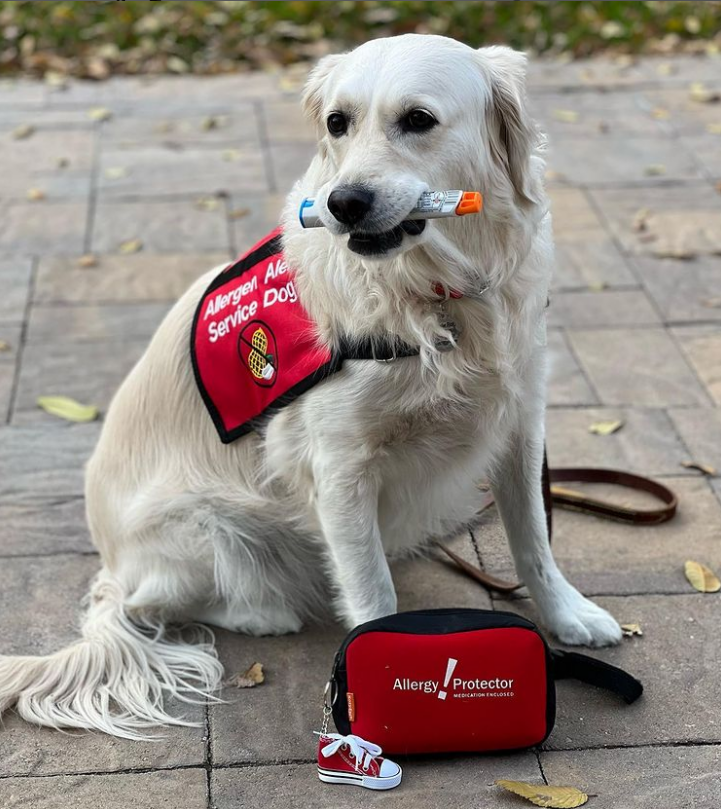
My daughter was a very picky eater and we were not peanut butter eaters, so until I decided to make her a good old PB&J sandwich for lunch one day when she was 4-years-old, she never came close to peanuts. I must have known because I stopped myself from giving her the sandwich and had her try just a tiny taste first…and low and behold, her ears, within seconds, were bright red and her mouth started to get itchy. Luckily she did not have a full blown anaphylactic reaction that day and an antihistamine brought things down, but we found ourselves at the allergist’s office the next week and her skin test came back as a 4+ which, on our allergist’s scale, is the highest it can be. It was then that everything changed and I was getting EpiPens and packing medical kits and ordering bracelets, etc.
My daughter was (and is) very shy and didn’t speak up for herself and it made me very nervous that she wouldn’t speak up for herself in the event that she was having a reaction. I had read about allergen alert dogs – peanut specifically – and thought that would be great for her. Everyone else thought I was nuts (no pun intended), so I let it go and we had to find our own way like every other newly diagnosed allergy family.
Fast forward 4 years and my daughter was at school when a girl in her class brought a peanut butter sandwich to school. It was taken away because one child with an allergy meant that the class was peanut free. The girl was mad and threatened my daughter at lunch the next day when my daughter, who was understandably scared, asked the girl if she brought peanut butter for lunch and the girl said, “No. And if you ask me again, I’m going to bring a spoonful to school and shove it in your mouth. Don’t worry – I will pay for you to go to the hospital.” When my daughter told me about it, she was crying, saying that she could die from it. And she was absolutely right. Someone without food allergies doesn’t understand the gravity of a threat like that, but anyone who has a life-threatening food allergy knows what that could do to them. It was a traumatic experience, and it set off a level of anxiety over her allergy that she had not had before. From that point forward, going out to eat and traveling became infinitely more difficult, as she was afraid to eat outside of the house. This is when I went back to my original allergen alert dog idea and this time, nobody in our family was laughing – they all agreed that if the extra level of protection provided by the dog checking her food would make her quality of life better, then we should do it.
2. How long did the training take and what did it entail?
There is a lot of research and planning involved in the whole process. I researched trainers, called their references, spoke to a number of people, and chose Nosey Dog Detection Partners in Aladdin, Wyoming, where Harley was trained by Kathy Watters. The entire process took over a year and a half.
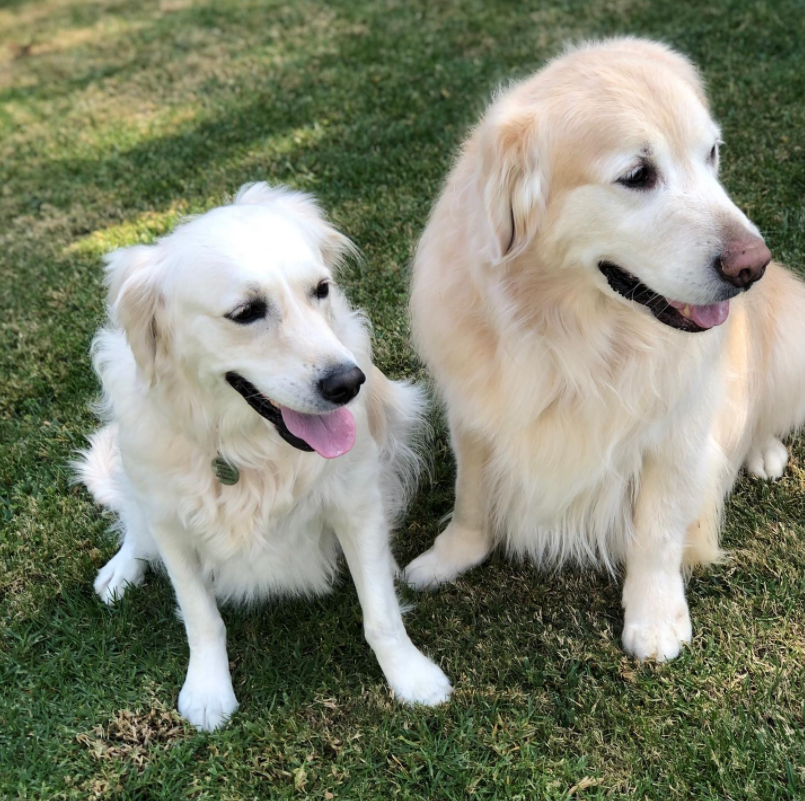
We started with one golden retriever puppy, Phoebe (our other dog is named Joey, if you are a FRIENDS fan). Phoebe is a wonderful dog but she wasn’t a good fit for scent work, so we transported her to us in Southern California and she’s living the good life with our very dear friends and their goldendoodle.
At this point we had to wait for another litter from a breeder in Montana that specializes in hunting retrievers – these dogs have the drive to work. After being tested for “treat motivation” and temperament, Harley was selected by Kathy and the breeder. Kathy picked her up when she was about 3 months old and she trained with Kathy for a year before Harley came home to Los Angeles. So, while we knew Harley from day 1, she didn’t meet us until she was about 15 months old.
While I cannot speak to all of her training as I was not there for the day-to-day and training methods are proprietary to trainers, the foundation of detection work is imprinting, where the dog is trained to recognize a target odor. For Harley, the target odor is peanuts. For other dogs, it is gluten. And for others, it can be multiple odors.
3. How has it changed your day-to-day life?
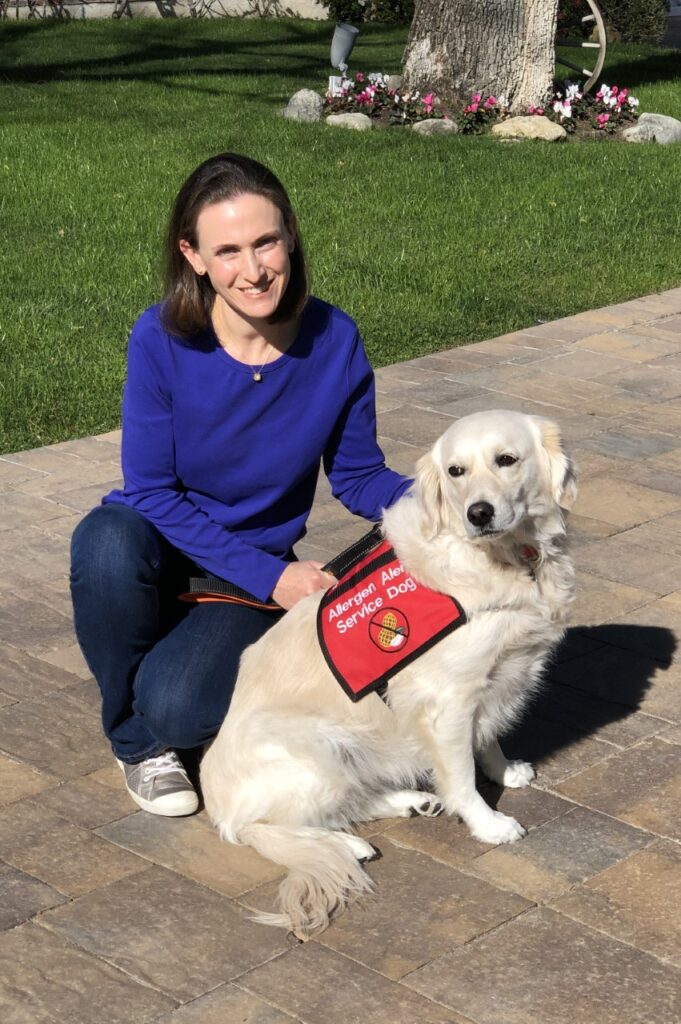
Harley has changed the way we handle what we call the “unknowns” – restaurants, bakeries, traveling, etc. We can read packages and have her double check them for us, but the real difference she makes in our lives is giving us an extra layer of protection when it comes to eating in restaurants and traveling. We always tell restaurant servers and alert hotels about the peanut allergy, but, as anyone with a food allergy knows, you are putting your safety in the hands of strangers and that is a very scary feeling. Harley checking the food puts us at ease that the food is safe, or she catches their mistake before it’s eaten and saves us from an allergic reaction.
One thing to take note on is that while having a service dog helps tremendously with a disability, it is still an animal and a responsibility. At home, she checks any questionable packages and any food we bring in, but otherwise she enjoys herself just like Joey. When we’re out, there is planning involved and extra supplies to take with me – almost like taking another child along with me. So, while life is so much better, with that comes the work and responsibility of handling a service dog.
4. Why did you set up your Instagram page and what do you hope to achieve?
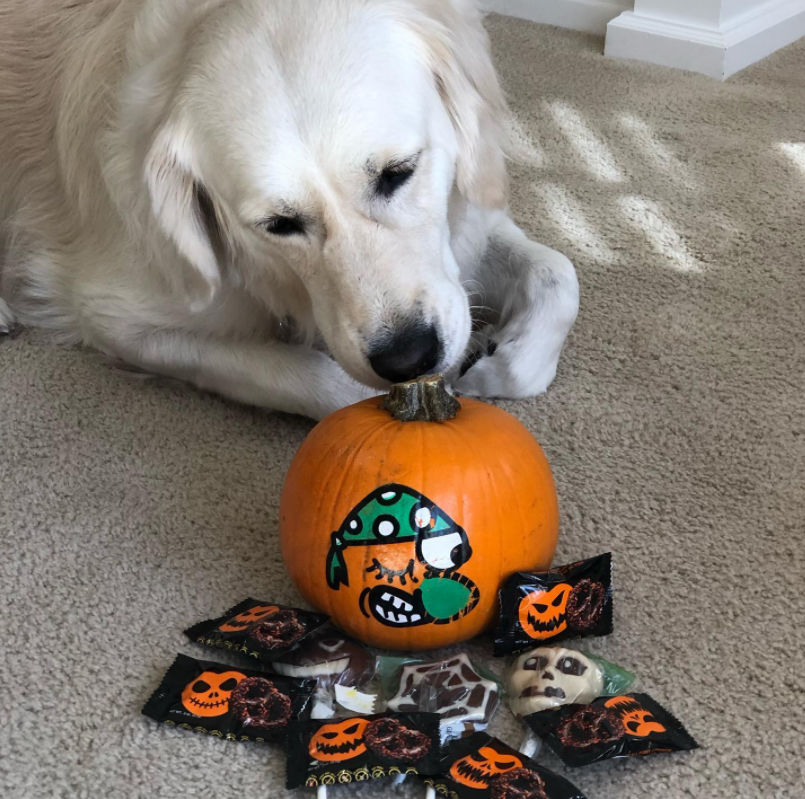
I initially set up @peanutfreewithharley for fun – I set it up right before Covid hit. Then we were quarantined and I was overwhelmed with distance learning with my kids and I couldn’t do much with it – just a little here and there. I was also very upset, as Harley had just arrived 3 months earlier to change our lives outside of the house and here we were stuck in the house. But, I was determined to keep up her training with anything coming into the house. I’m embarrassed to admit that we did a lot of takeout during Covid, but Harley checked everything coming into the house. One night she made an amazing save on what turned out to be Thai noodles (the restaurant was very apologetic). It could have been disastrous, but she saved the day. I kept working with her and started videoing and posting, and little by little we were getting more activity. When the kids finally went back to in-person school this fall, I focused more on the videos, as I was seeing that Harley’s checks can teach lessons: She can show what people can’t see and/or don’t necessarily believe. This is when I realized that we can spread food allergy awareness and that became our focus.
A couple of our reels went viral and, as anyone who is in that position for the first time, I read all the comments. Some were amazing, reinforcing that we truly are helping to spread food allergy awareness. Some were awful, showing me that more work needs to be done and, based on the horrible comments by adults, the education needs to start when children are young. This was when I came up with the idea for @detectiveharleyfadd : Detective Harley, Food Allergy Detection Dog. As the International Spokesdog for the food allergy community, our goal is to change the narrative on food allergies by educating, empowering, and encouraging empathy in children (and their parents) from a young age, whether they are a food allergy family or they know a food allergy family. The more people who understand from a young age, the more accepting the world will be to people with food allergies as these kids grow up.
5. Was it the main piece of advice you can offer people with allergies?
Always carry two epinephrine injectors, read all labels, speak up for yourself, and when in doubt, skip it because it’s not worth it. And if you are able to, educate the people around you about the severity of food allergies and how one bite can be the difference between life and death. The thought of it is crazy, especially to those that don’t understand, but those of us with food allergies are in a unique position to teach others and the more we do so, the more accepting people will be.
6. What is one fun/interesting fact about you and your dog?
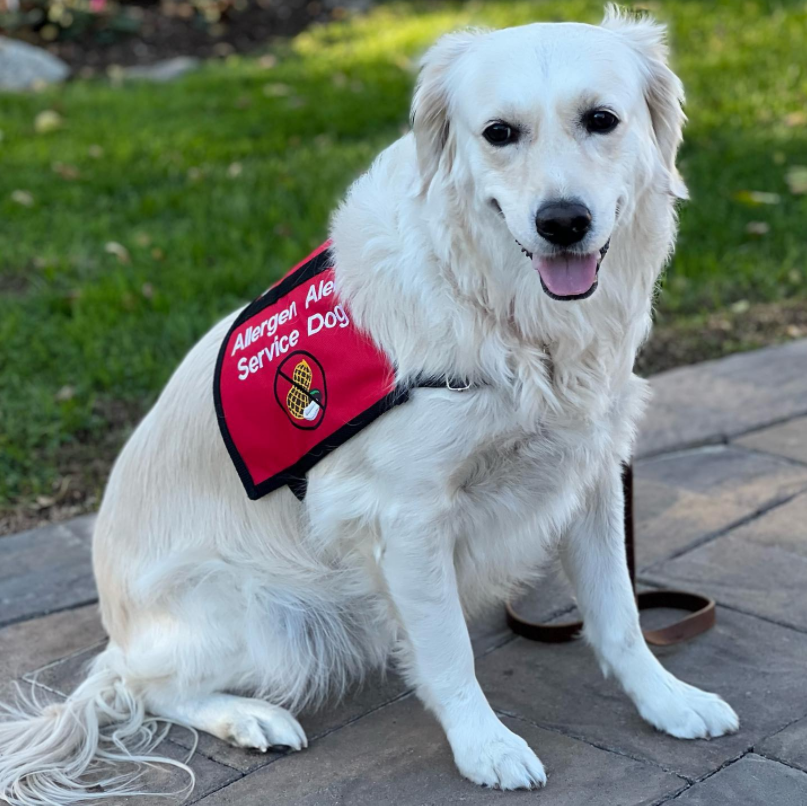
I’ve had golden retrievers all my life – my parents had one when I was born and when I was old enough, he used to sleep with his head on the pillow next to me. Harley is my 6th golden retriever, but the first female that I’ve ever had. She looks quite stoic in the videos, but she can be a bit of a stinker. She loves to get dirty, she always reminds me when it’s time to eat, and she likes watching tv with all of us, but goes crazy when any kind of animal comes on the screen, especially dogs. She has a silly habit of laying halfway in my daughter’s room and halfway sticking out into the hallway. And when she wants to be pet, she will come sit with her back to me and turn to look at me. If I don’t pet her right away, she is insulted and walks away. Luckily that doesn’t happen too often because I can’t resist that look!
I’d like to say a massive thank you to Natalie for answering my questions. If you want more information, please go and check out their social media at: @peanutfreewithharley and @detectiveharleyfadd.





